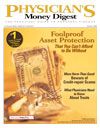12 Tax Scams You May Encounter This Year
Would you knowwhat to look forto avoid an abusivetax scheme?Are you aware ofthe tax scams that crooks utilize on adaily basis? For example, if someonesuggested that income tax is unconstitutional,would you believe it?Hopefully, you would not, because itisn't true. In anticipation of these fraudulentpitches, each year the IRS revealsthe newest scams known as the DirtyDozen, which try to manipulate laws.
So taxpayers beware, the DirtyDozen reminds us that tax scams takemany forms. To avoid getting caughtup in any one of these schemes, it isimperative to stay alert to propositionsthat can seriously mess up your life andyour finances.
This year, the Dirty Dozen includesthe following:
1. Zero wages. This is a fairlynew scam where the taxpayer attachesan incorrect form known as Form4852 (ie, a substitute Form W-2) or acorrected 1099 that shows zero incomeor little income. It probablyincludes a statement indicating a rebuttalof information that was previouslysubmitted to the IRS. Beware ofanyone who encourages you todeclare zero wages.
2. Form 843 tax abatement. Thisis also a new scam in which filers useIRS forms to claim their tax bills havebeen wrongly inflated. By misinterpretingthe law, a taxpayer will wrongly tryto get a refund of previous years' taxes.Many using this scam have not previouslyfiled tax returns.
3. Phishing. One of the more commontax scams these days is occurringon the Internet. Known as "phishing," it is plainly an attempt at identity theft.The unsuspecting person receives an emailclaiming to be from the IRS butit's actually linked to a fake IRS Website meant to solicit a taxpayer's personalinformation, such as a SocialSecurity number. The con artist thenuses the information to file for a fraudulentrefund. If you receive an e-mailclaiming to be from the IRS but youare suspicious, call 800-829-1040 toreport it.
4. Zero return. Fraudulent promotersinstruct taxpayers to enter all zeroson their federal income tax filings.Naturally, returns with all zeros arenot valid. If a preparer tells you toenter all zeros on your federal taxreturn, report them immediately.
5. Trust misuse. Unscrupulous taxscheme promoters urge taxpayers touse offshore trusts to hide assets.Taxpayers should be very cautiousabout trust misuse and should seek theadvice of a trusted professional beforeentering into a trust. If anyone encouragesyou to transfer your assets into atrust to reduce your amount of incomesubject to tax, you should be cautious.Several promoters and their clientshave been prosecuted for this abuse.
6. Frivolous arguments. Underthis scam, various constitutional argumentsclaim that filing and payingtaxes is voluntary. The fraudulent promoterwill allege that the SixteenthAmendment concerning congressionalpower to lay and collect income taxeswas never ratified, implying that theIRS lacks the authority to collect taxes.This is absolutely untrue.
7. Return preparer fraud. If itsounds too good to be true, it usuallyis. Return preparer fraud usually constitutespreparing and filing falseincome tax returns by preparers whoinflate personal or business expenses,make false deductions, include excessiveexemptions, and apply credits thatare not allowed. Taxpayers are responsiblefor accurate tax returns, so beaware of tax return preparers whopromise big refunds. Make sure thecompany or preparer you are workingwith is credible.
8. Credit counseling agencies.Reputable credit counseling agenciescan advise you in regard to managingmoney and debts, but taxpayersshould use caution when soliciting thehelp of credit counseling organizations.They may claim to fix credit ratings,but agencies that push debt paymentagreements or charge highamounts for their services could potentiallyadd to existing debt. The IRS TaxExempt and Government Entities Divisionis currently in the process ofrevoking the tax-exempt status of abusiveagencies.
9. Abuse of charitable organizationsand deductions. The IRS hasobserved increased use of tax-exemptorganizations that improperly shieldincome or assets from taxation. In thisscam, a taxpayer may try to moveassets or income to a tax-exemptorganization but maintains controlover the income or assets.
10. Offshore transactions. TheIRS aggressively pursues those who tryto avoid US taxes by illegally hidingincome in offshore banks and brokerageaccounts or uses offshore creditcards, wire transfers, foreign trusts,and employee leasing schemes to hidemoney. The IRS has beefed up themoney it will spend in the next 4 yearsto investigate these activities.
11. Employment tax evasion.Some scam artists encourage employersnot to withhold federal income taxor other income taxes. This is based onan incorrect interpretation of the relatedtax code and is repeatedly provenfalse in court.
12. No gain deduction. Under thisscheme, some tax filers try to eliminatetheir entire adjusted gross income bydeducting it on Schedule A with thewords "No Gain Realized." Thisdeduction has no basis in law, so if youare confronted with this, take heed. Itwon't fly with the IRS.
The IRS routinely pursues and shutsdown promoters of these scams and iscurrently investigating high-wealth individualsand their associates. It is hopingto boost government coffers by $615million over the next 4 years. In fact, theIRS recently announced that it wouldspend $272.8 million over next 4 yearsinvestigating and prosecuting underOperation Wickenby, which looks intoalleged fraud involving the use of offshoreentities. If you think you've beena victim of tax fraud, you may call theIRS at 800-829-0433 to learn more. IRSemployees are looking out for the bestinterest of the government.
Becky Schmitz, owner of CentsableAccounting, has recently been named the2006 Top Practitioner from the AmericanSociety of the Tax Problem Solvers. For moreinformation, visit www.centsableaccounting.com. Reprinted with permission from S. J. MillerCommunications.
